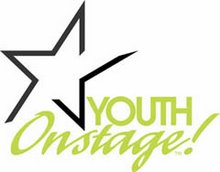At Saturday's rehearsal we branched out in a lot of new directions. The performers were told to bring in other texts that they felt had some connection to our two poems. These ranged from Gilbert calling our attention to a Subway commercial to Kristina reciting the Internationale. We have more music on the way, too: in subsequent rehearsals, we'll be listening to songs by Lou Reed and Nas, suggested by Tabitha and Eugene.
One of the topics on Saturday was how America presents, or "sells," itself. The "American Dream" is a product like any other and one group presented a very funny commerical (inspired by Subway) that was meant to show how America was more free than other countries. We also talked a lot about the visions that people in other countries have of what America is like. Several performers concurred that their relatives back home in Haiti, the Dominican Republic, and Trinidad all have exaggerated ideas of how prosperous America is. Tabitha's grandmother, upon first visiting New York and seeing steam rise up out of the manhole covers, thought that it meant the streets were heated! This vision of America as a "land of plenty" has been around since the 19th Century and even before that. It is said that earlier generations of immigrants to America thought they would arrive to find the streets paved with gold.
Our discussion of opportunities in America continued with an extended analysis of the Will Smith movie "The Pursuit of Happyness". We talked for quite a while about whether this film, based on a true story, provided evidence that, with enough self-determination, someone could raise themselves up from poverty by their bootstraps and achieve financial success. Some people argued that Will Smith's character was an extraordinary person who put up with an incredible amount of setbacks, which the average job-seeker would not have been able to overcome.
We ended the day by exploring the notion of "freedom" in more detail. Inspired by Tabitha's refence to Rousseau's idea that "civilization begins with fences," we asked what complete freedom would really look like. Would it be a blissful state of complete liberty and cooperation or total chaos? Are some restrictions on freedom good just so that we can accomlish things as a society? The American poet Robert Frost includes a famous adage in one of his poems: "Good fences make good neighbors".
Judy ended the day with some exercises exploring what "total freedom" felt like. I'm going to write more about that on a subsequent post, because the results were so interesting. Or maybe Judy (or one of the cast) wants to tell us about it??
Subscribe to:
Post Comments (Atom)

3 comments:
I wanted to touch on something that a few people have mentioned. Yeah in our rehearsal discussions most of the ensemble bashes America but we have not yet discussed the good things that America offers, I agree. I think thats the whole thing! The "bad America" outweighs the "good America".
And also I heard some one say something about how if we're complaining so much about "bad America" what are we going to do about it?!?!, again I agree. If I can just speake for everyone for a second... we are busy struggling to live our lives (1), and (2) (not many people think of this, but I do for some reasone), Think about the last presidential election. To me it was clearly Kerrys win but some how... SOME HOW Bush won. Conspiracy! If the government can conspire things such as that, who even wants to try and do something to change whats occuring in the world today. Because, than in the end, if the government wants to, they will do what they please. The only way a change will happen, in my oppinion, is if there is some one on the inside with a golden heart who care about "THE PEOPLE" to even have a chance of changing things for the best of "THE PEOPLE".
Cynthia, one "good" thing we've mentioned about America is our freedom of speech -- which allows us to put on this show in the first place.
I don't know if I think the 2004 election was rigged, though there are some people who say that. You can read about that here. One thing that's important to remember is that there are lots of other ways to change society than merely voting -- lobbying, protesting, organizing people in your communities. That's how the All Stars was founded -- totally outside of government -- and sometimes that can be the most effective way for change to happen.
Post a Comment